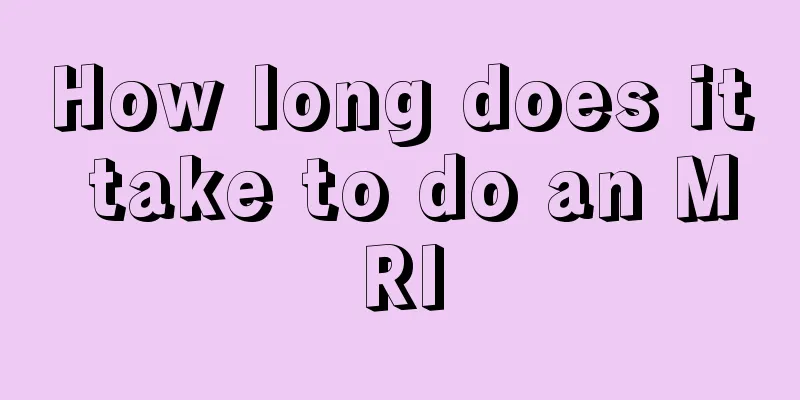How long does it take to do an MRI

|
In clinical medicine, a variety of methods are used to conduct certain examinations on the patient's body. Through these examinations, doctors can understand the patient's condition, which also helps to develop a more reasonable treatment plan. Magnetic resonance imaging is a frequently used examination method. So, how long does it take to do an MRI? The relevant knowledge is introduced below! 1. How long does it take to do an MRI? Magnetic resonance imaging is a very advanced medical imaging technology with very high resolution. And because it uses magnetic fields and computers to create images and does not produce X-rays, MRI is radiation-free and has very small side effects. Generally speaking, an MRI examination takes about 15 to 20 minutes. The time may fluctuate depending on the part you examine and the sequence you choose. Sometimes, inefficient hospitals may also cause the time to be extended. It is possible that a single examination may take up to 30 minutes. 2. How long does it take for an MRI to produce results? Generally speaking, the results of an MRI examination can be obtained on the same day, or even within an hour. But this also depends on the condition of your illness. If it is a difficult and complicated disease, the process will be more complicated and a result will not be obtained directly. Generally speaking, it takes about 15 to 30 minutes to perform an MRI of a certain area. 3. Is MRI harmful to the body? An MRI does no harm to your body. MRI examinations can be said to have no radiation, so they are basically harmless to the body. You should adjust your mindset, face it positively, and avoid any psychological sequelae. 4. Precautions for doing NMR 1. Do not bring in any metal objects, because MRI utilizes a magnetic field. 2. If you have any metal objects implanted in your body, be sure to tell your doctor in advance and ask if you can have an MRI. 3. Relax your mind and stay calm during the inspection. 5. Tips 1. After completing the MRI, you can supplement some glucose and protein appropriately. 2. You can eat more whole grains. 3. You can eat more celery. 4. Adjust your mentality and don’t have any psychological burden. |
Recommend
What are the best ways to open up meridians?
If the meridians are blocked, it will have a grea...
How to choose a hospital to treat glioma
At present, the main methods of treating glioma a...
What to do if my hands itch after eating yam
People who often buy vegetables know that there a...
What is the best way to treat liver cancer? Liver cancer patients need to pay attention to these dietary matters
"I had a physical examination two years ago,...
What are the functions of probiotics?
The number of bacteria in our human body is 10 ti...
What's wrong with sleepy eyes
Many times people don’t understand what is happen...
Patients need to have a certain understanding of the symptoms of mid-to-late stage laryngeal cancer
In today's society, the incidence of laryngea...
How to overcome psychological barriers
Psychological disorders are a type of psychologic...
How to eat grape seeds effectively
Grape seeds have a good antioxidant effect and ha...
The difference between bleaching and dyeing hair
There is a big difference between bleaching and d...
There are 5 fire-removing points on the human body
toothache As the saying goes, "A toothache i...
Will wearing a bra for a long time cause breast cancer? Two reasons why wearing a bra can induce breast cancer
Women must wear bras when they go out. "Faqi...
Will vocal cord leukoplakia definitely turn into laryngeal cancer?
Vocal cord leukoplakia does not necessarily turn ...
What are the symptoms of lung cancer brain metastasis? There are seven ways to treat it
There are many symptoms after lung cancer brain m...
How to prevent testicular cancer
Testicular cancer occurs in testicular tissue and...









